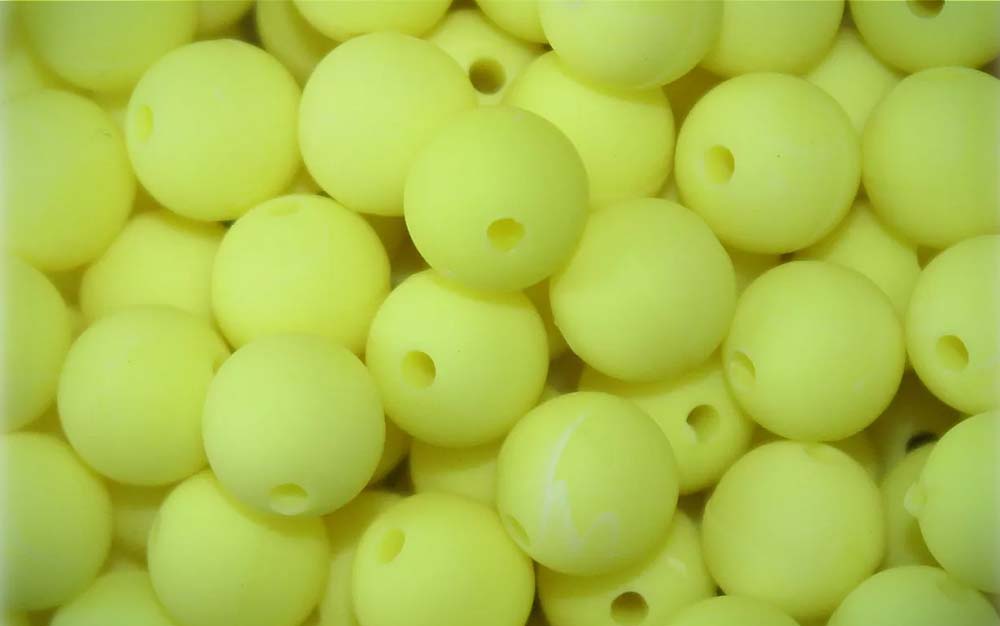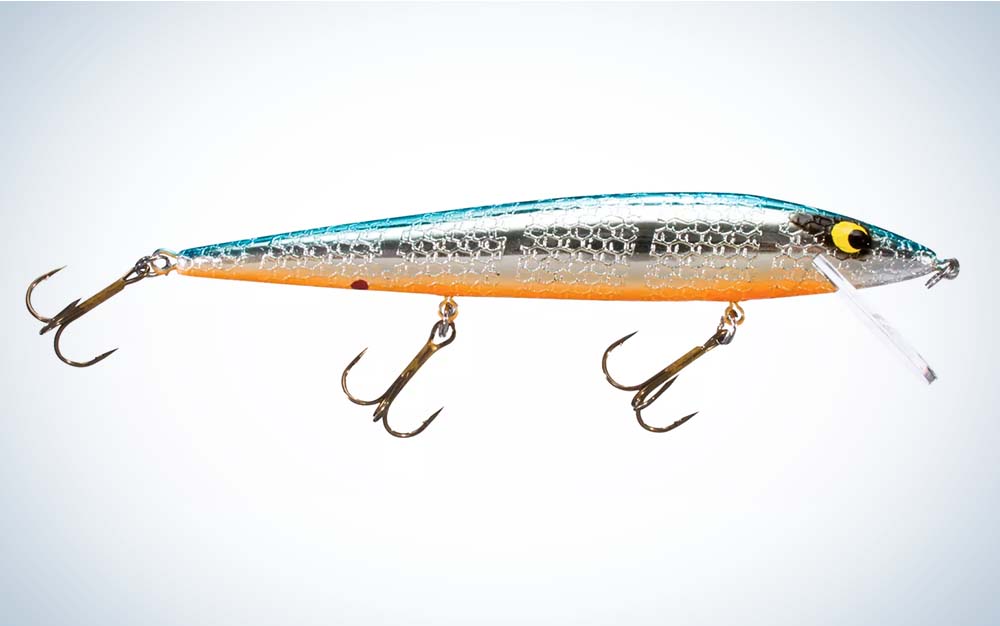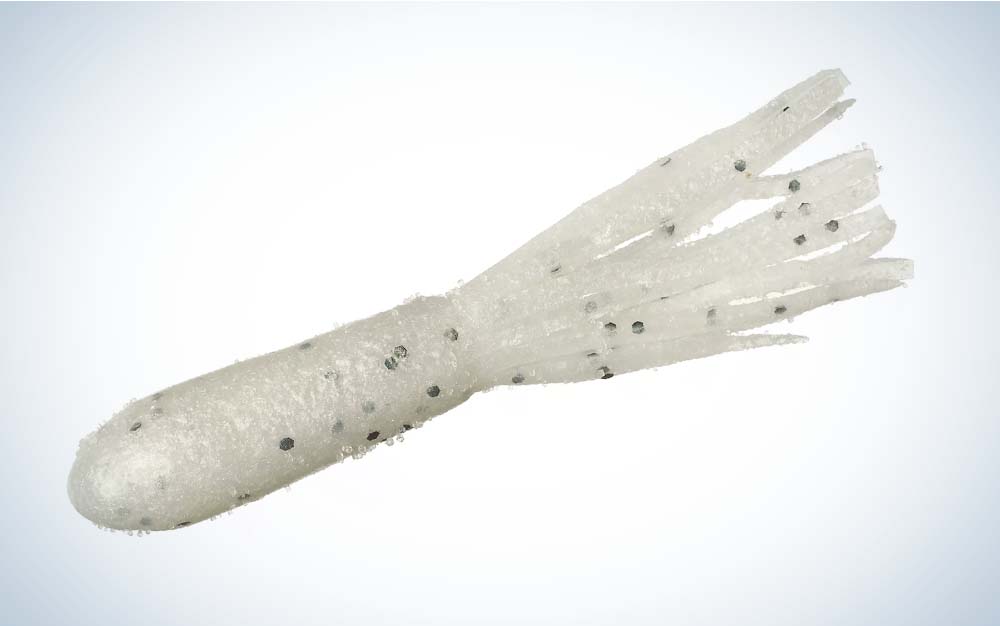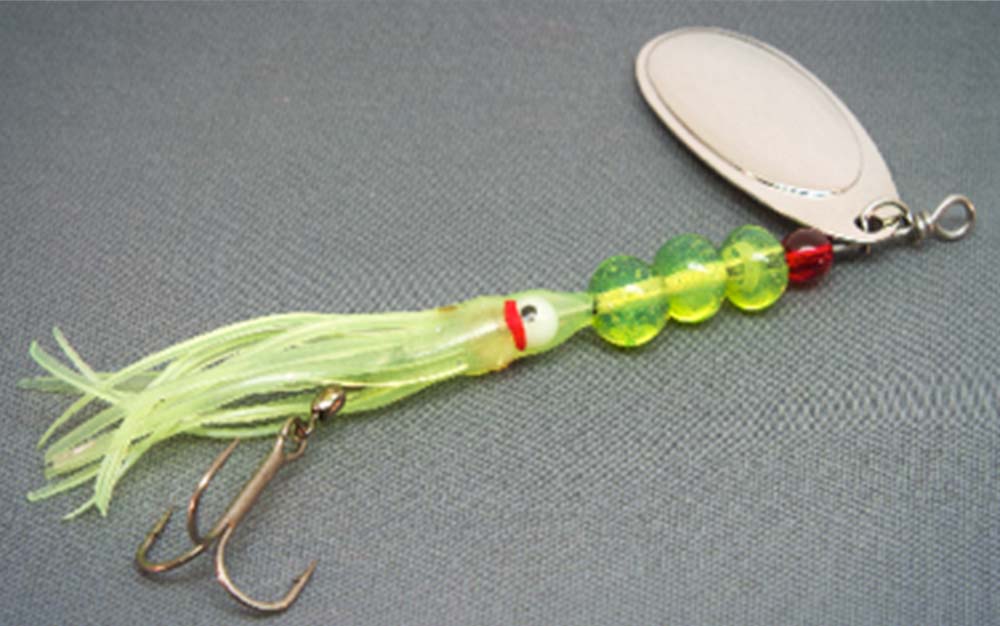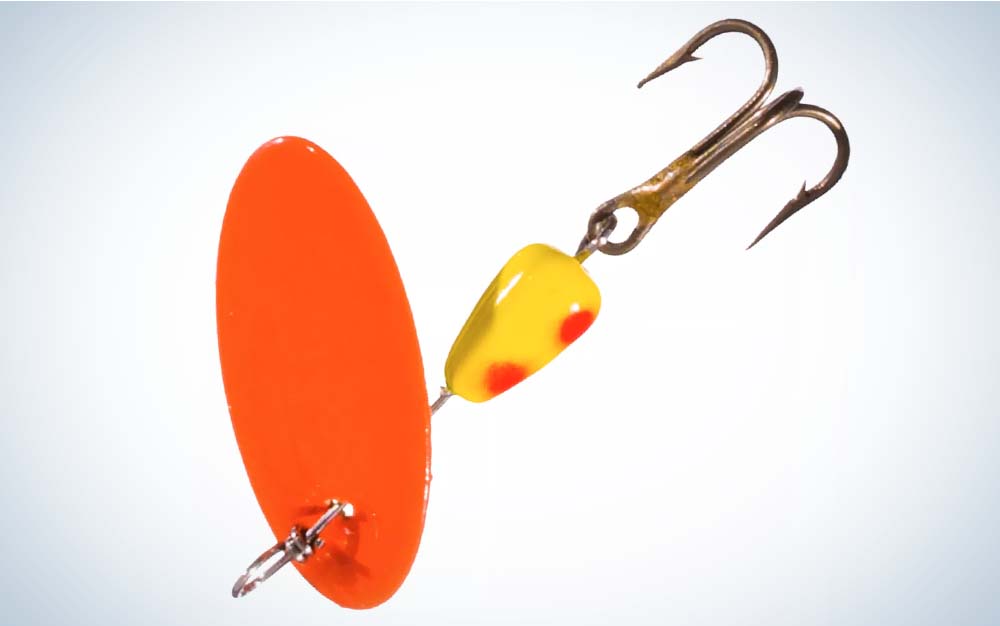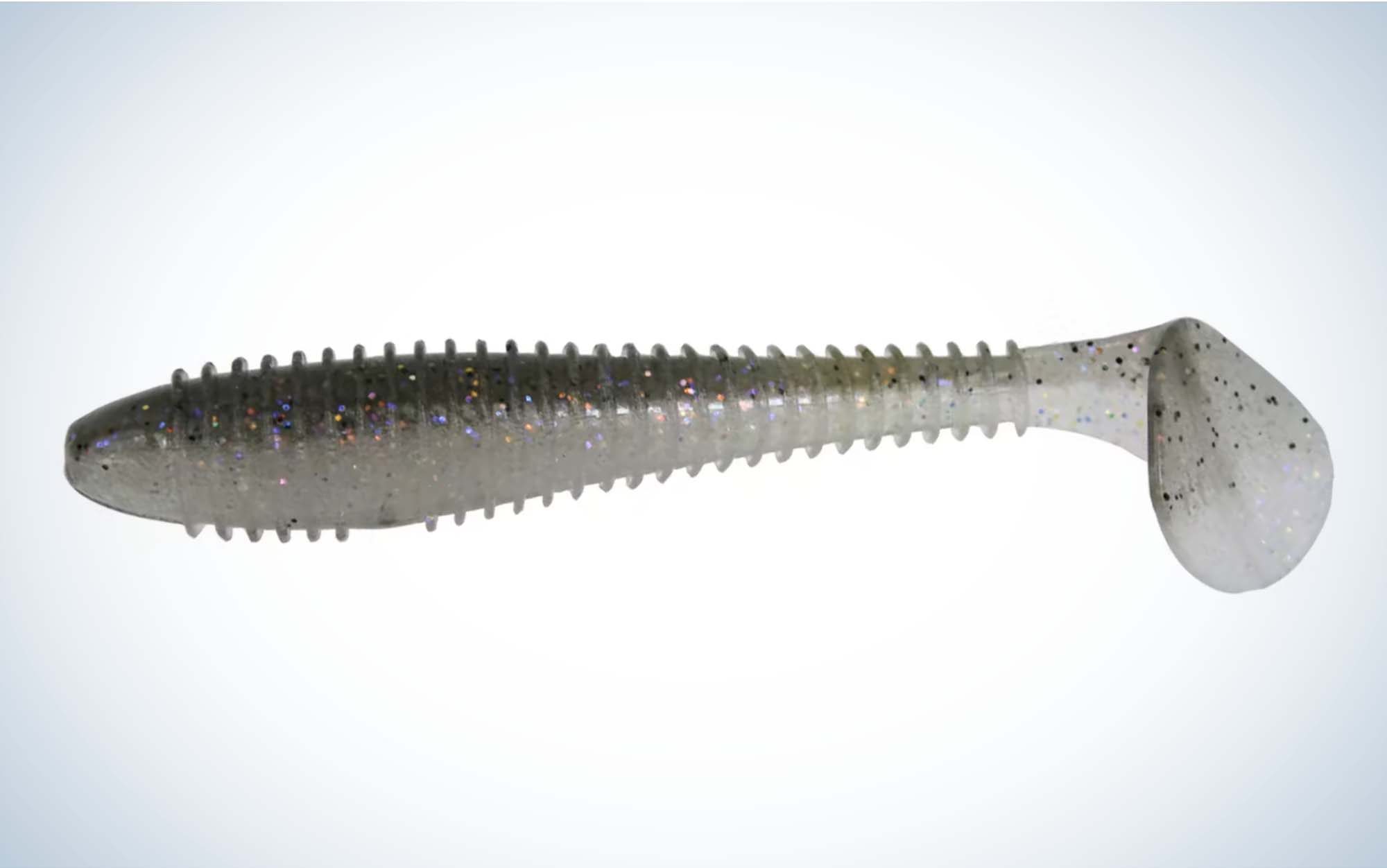We may earn revenue from the products available on this page and participate in affiliate programs. Learn More ›
Updated Feb 8, 2023 4:25 PM
Trout are one of the most sought-after gamefish the world over. Their diversity of species and the wide range of habitats they call home mean that many anglers have an opportunity to target them, regardless of their location. The techniques and lures used to catch trout are just as varied as their habitat. So, when I set out to compile the list of the best trout lures, I took a regional approach and talked to the best trout anglers across the country to get their top lures. You’ll find the best trout lures for catching everything from lakers to wild brookies.
Methodology
The tricky apart about choosing the best trout lures is that the best for catching stocked trout in the Northeast is different from the best for catching a trophy brown trout in the Ozarks. To navigate the regional preferences, I interviewed trout experts from around the country about their favorite lures and techniques. You’ll not only find their go to lure, but you’ll also get tips on how to fish them.
The Best Trout Lures Reviews and Recommendations
Best Lure for Stocked Rainbow Trout: The Trout Magnet
Key Features
- Simple rig
- Uniform size
- Large selection of colors
Pros
- Very easy to fish
- Inexpensive
Cons
- Doesn’t cover much water
- A one-trick pony for presentation
The key to the Trout Magnet’s success is in the unique shape of the jighead, which allows it to dart and swim with minimal effort and entice wary trout.
Rather than a standard round ball jig, the magnet body attaches to an angled dart-style head. The body is mealworm-shaped and comes in a variety of colors. The unique head allows the lure to swim and weave in the river current with effectively no effort from the angler.
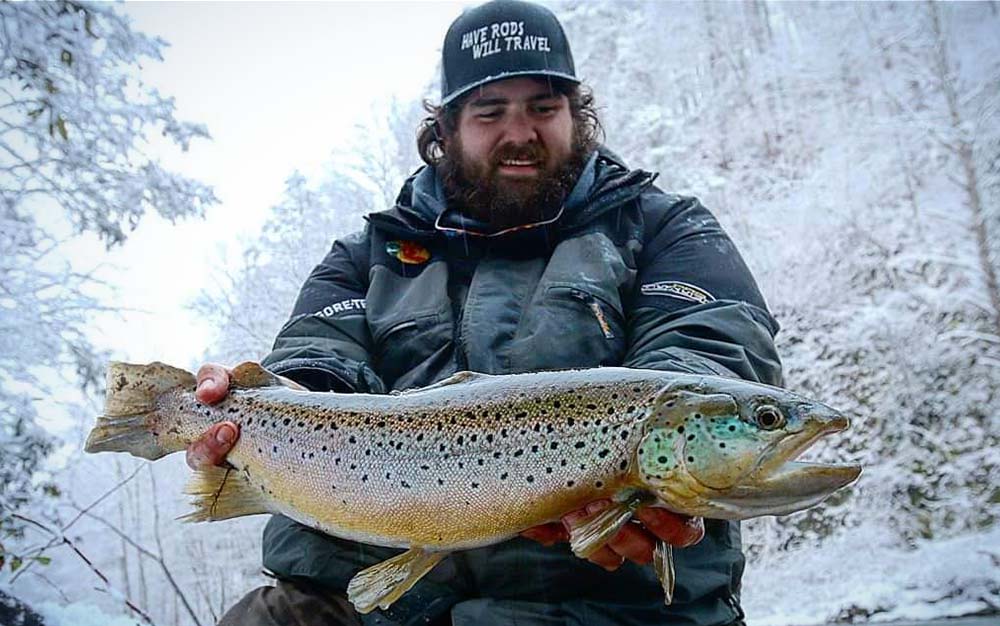
The best way to fish the Trout Magnet is by not working it at all. Position the trout magnet below the float of your choice and allow it to drift with the current through likely trout holes. Virginia angler Josh Dolin says, “Trout Magnets, and even the larger crappie magnets, are great for fish that are straight off the (stocker) truck.” However, he does note that the longer the fish are in the ecosystem, the less the magnets tend to work. When that becomes the case, Dolin prefers to switch to hand-tied marabou jigs fished similarly to the magnet (below a float) or jigged freely.
The best rod for fishing a Trout Magnet measures seven feet or above and should be rigged with a very light line. Popular options are two to six pound monofilament, or 6- to 10-pound braid with a light 2- to 6-pound fluorocarbon leader.
Best for Lake Run Trout: The Trout Bead
Key Features
- Simple presentation
- Huge variety of color choices
- Size: 8mm-12mm
Pros
- Simple to use and effective
- Relatively inexpensive
Cons
- Requires specialized gear to properly fish

You can catch lake-run trout in a number of ways, but one stands above the rest as the choice for most Great Lakes tributary anglers: the Trout Bead.
Trout Beads imitate a trout or salmon egg. They’re essentially a single round ball of glass, usually orange or pink, that’s attached to the leader a few inches above a hook. Above that can be anywhere from three to 6 feet of leader (usually 6-pound fluoro) that’s attached to a small barrel swivel. Above the swivel is a small float with a split shot just below it to help maintain balance.
Don’t let the rig’s basic appearance fool you. It’s astoundingly effective, and it requires a specific technique. Pat Kiehm of Pat Kiehm Guide Service specializes in putting anglers on trophy steelhead and brown trout in the Milwaukee area. He has several tips and tricks for effectively fishing a bead for big trout. His first tip is to use a technique called banding, which allows you to swap beads without having to retie.
“Rather than pegging the bead to the line like most people do, I prefer to fold the line into a loop and push it through the bead hole,” Kiehm said. “Then I’ll take a rubber band, thread it into the exposed loop, and pull the line, so the band is pulled into the bead.”
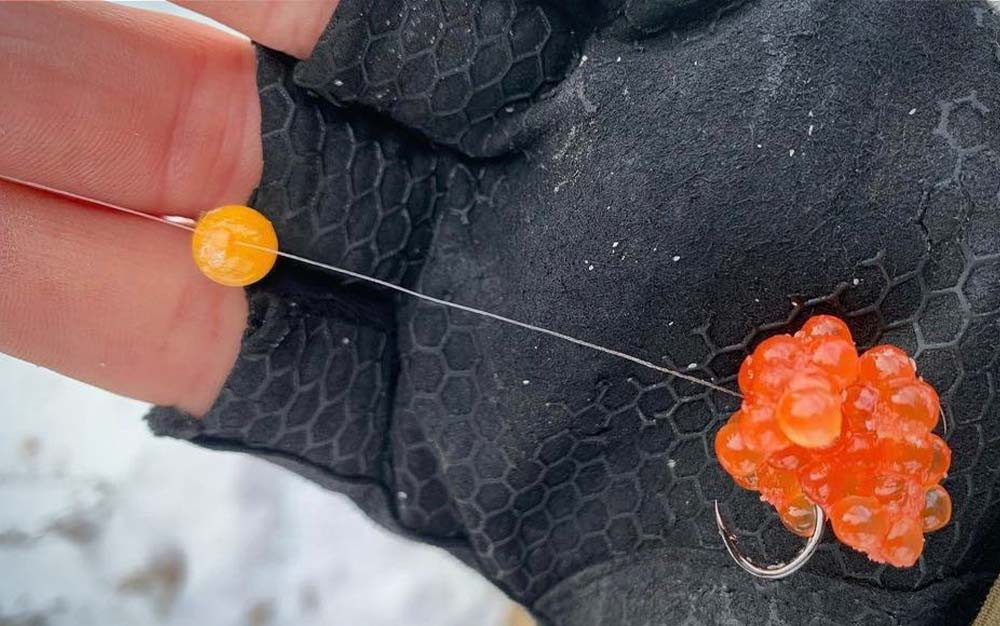

Occasionally, Kiem will use a double bead rig to find out which color the trout prefer that day. This involves rigging one standard bead and attaching a second a few inches below the first.
Regardless of which color bead or rig you use, the technique for fishing them remains consistent. It’s essential to have a very long rod, usually referred to as a noodle rod, that can be anywhere from nine up to fifteen feet long. This is important to get the bead out and maintain the most natural drift possible. It also helps eliminate strain on the light fishing line (usually six to ten-pound mono) when fighting these large fish in moving water.
While there are many bead manufacturers to choose from, Kiehm prefers the beads made by Bloop Bead Company. They’re hand painted, and they have an incredible variety of colors to choose from, most of which cater to the region.
Best Trophy Brown Trout Lure: The Smithwick Suspending Rattlin Rogue
Key Features
- Length: 4 ½ inches
- Weight: 3/8 ounces
- Can be fished in a variety of ways
- Long casting
Pros
- Covers a lot of water
- Targets larger fish
Cons
- Requires some experience to present properly
- Three treble hooks can be messy and difficult to manage on thrashing trout
- Lots of hooks means lots of snags
Many jerkbaits catch fish, but one of the most classic and effective designs is the Smithwick Rattlin Rogue. The Rogue has the perfect combination of suspending ability and jerking action that draws strikes from the biggest trout in the run.
The Rogue has a classic jerkbait design, with a long baitfish body that tapers to a slim tail. The shape of the Rogue differs from many other suspending jerkbaits in that the head is slightly more bulbous, which lends it a larger wobble on the pause than other similar lures. The body three treble hooks adorn the underside, which can be a little frustrating at times but are important to the sink rate of the lure.
Donald Cranor of Cranor’s Guide Service has spent nearly 40 years guiding one of the big brown trout meccas of the world, the White River in Arkansas. This river is home to numerous record-setting brown trout, and it’s the destination of choice for many anglers looking to land a true trophy trout. Cranor has his clients throw a Rogue the majority of the time but is careful to note that the color choices can vary based on conditions.
“On cloudy days, we like to throw the darker patterns, like the black and silver model with an orange belly,” Cranor said. “On sunnier days, we usually throw something a little lighter, usually the blue and silver model, still with an orange belly.” Cranor also notes that when the river is low and clear, it can pay to change up the presentation entirely. He switches from the Rogue to a Rebel Trackdown Minnow when these conditions are present. The smaller profile and shallower running lure can be more effective at these times.
These lures can be fished on most standard medium spinning or baitcasting setups, and Cranor prefers a 10-pound braid mainline with a 10-pound fluorocarbon leader.
Best Lure for Ice Fishing Big Lake Trout: White Tube Jig
Key Features
- Length: 3 to 10 inches
- Soft plastic body
- Available in a large selection of colors—white or silver work best
- Great for jigging through ice or open water
Pros
- Proven and effective
- Simple presentation
- Cheap and easy to find
Cons
- Popular use can make fish wary
- Easily torn up by toothy trout
Retired guide Bernie Keefe fished the famous Lake Granby in Colorado for over thirty years, specializing in targeting the giant lakers that call it home. He says that the classic 4-inch white tube jig setup has probably landed more lake trout through the ice than most other presentations combined.
The tube can be fished in various ways, with the most common being “deadsticking.” This technique involves keeping the jig perfectly parallel to and just off the surface of the lakebed, moving it very little, if at all.
If that’s not working, it can pay to jig the tube up and down at varying speeds and depths. Another very effective technique is to allow the jig to fall from the surface all the way to the bottom and then reel it up and drop it again until it gets eaten. The tube will spiral and dart as it falls, imitating a dying baitfish and enticing strikes from aggressive lakers. It’s worth noting that while these techniques are popular through the ice, they can be just as effective for lake trout in open water as well.
The best tube size for trophy trout is four inches, in white or silver. They’re typically rigged on a tube jighead, weighted appropriately to the size of the tube (⅛ ounce up to 1 ounce).
While the tube is a classic and proven lure, its popularity means that fish can sometimes become used to seeing it. When fish become wary of the tube, Keefe has a unique backup presentation that he says outfishes just about anything else: a 3-inch white Berkley Power Grub. While that may not sound unique at first, he fishes it with a twist.
“One day we ran out of tubes, so we switched to some power grubs that I had in the box,” Keefe said. “They weren’t working too well at first, so I ripped the curly tail off and just fished the solid grub body. It immediately started getting bites.” Since then, he says that a tail-less white power grub rigged on a bright and contrasting 3/16 ounce jighead, usually orange, is his go-to lure when targeting numbers of fish through the ice.
Best Lure for Trolling for Cutthroat Trout: Midliner Inline Spinner
Key Features
- Extremely durable
- Unique glass body
- Can be purchased with a variety of different hook styles
- Great for trolling
Pros
- Unique design creates more flash
- Covers a lot of water with minimal effort
- Very effective at a variety of depths
Cons
- Can be tedious
- Relatively expensive compared to similar lures
When searching for trout in large, open bodies of water, there aren’t many methods more effective than going on the troll. The Midliner series of spinners stands out as a unique option for wary trout that have seen every spoon and spinner.
Made by Shallow Glass Lures, the Midliner features a hand-blown glass bead body, which gives it a unique appearance and sound. Additionally, the glass is extremely durable and lined with metallic flash that draws fish in from a good distance. It’s larger than most inline spinners and uses brass or nickel’s #5 French blade. Positioned below the glass beads that make up the center of the spinner is a soft plastic squid body, a popular addition for many west coast anglers that target both trout and salmon.
Annie Nagel, a pro kayak and trout angler from California, regularly targets cutthroat trout on many of the large lakes in the region, including the famed Pyramid Lake in Nevada. “From the kayak, I have success targeting cutthroat trout (and cutbows) trolling the shorelines in the wintertime,” Nagel said. “If I need to get the spinner down, I’ll attach a ¼ or ½ ounce bullet weight and a swivel three to four feet above the spinner.”
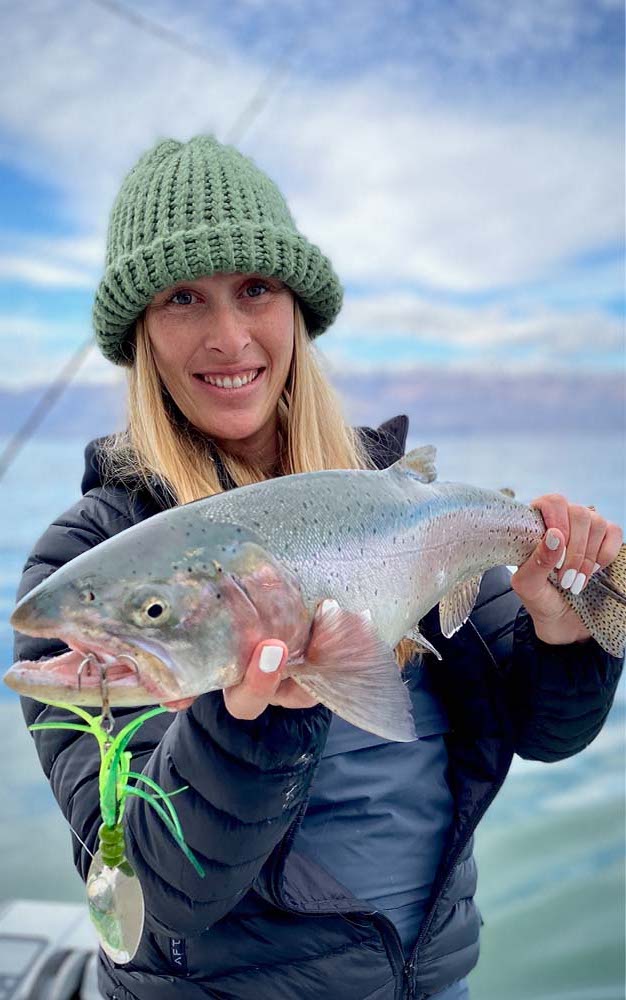
She also points out that when trolling larger bodies of water, such as Pyramid Lake, you may need the addition of a downrigger to help get the spinner to the desired depth, usually between ten and thirty feet.
Another great option: Yakima Bait Flash Glo UV Squid Trolling Spinner
Best Brook Trout Lure: Panther Martin In-Line Spinner
Key Features
- Classic simple design
- Size: 1/32-⅜ ounce
- Easy to fish but still active presentation
Pros
- Simple design
- Good for small water
- Active fishing
- Inexpensive
Cons
- Not effective on larger water
- Only allows for one downstream presentation
While there are several classic spinners to choose from, the Panther Martin has stood the test of time. Its unique design has proven effective on trout across the country for decades, and undoubtedly will for decades to come.
The Panther Martin comes in a number of patterns and colors, but the classic undressed version tends to be the favorite. It’s small, teardrop-shaped body is usually painted with one solid color and a few spots of a different color for accent. The blade design is what sets it apart from most other spinners on the market. The blade itself is fixed directly to the wire frame rather than being attached to the wire via a rotating swivel. This allows the blade to begin spinning quicker and also helps reduce line twist and tangles.
The Panther Martin is effective for trout just about anywhere, but it’s advantageous when targeting the wild brook trout. Seasoned brookie angler Jordan Hanscom refined his spinner technique in one of the country’s premier brook trout fisheries, Maine. “It’s [Maine] one of the last strongholds for stream-dwelling populations of wild brook trout in the country. It boasts more than double the brook trout population of the other 16 states in the eastern range combined,” Hanscom said.

Hanscom prefers to use small inline spinners like the Panther Martin because they are ideal for working the small pockets and seams in the streams the brookies call home. He says, “Look for deeper holes behind big rocks with current on either side, work those seams, and then hit the eddy. Fishing with spinners on super light gear, target the areas above your actual target and flash it right through. They will move fast to hit it, so be ready.”
Author’s note: Sadly, Jordan passed away shortly before this article was published. One of his final acts was sharing his love of brook trout fishing with Outdoor Life readers.
Best Swimbait: Keitech FAT Swing Impact Swimbait
Key Features
- 4-inch length
- Variety of 2-tone color patterns
- Ships in 7-pack
- Tight, wobbling action
Pros
- Unique presentation for educated trout
- Great for stained water
- Will trigger big fish to bite
Cons
- Not ideal for streams with smaller fish
Trout are used to eating smaller meals like bugs, so when they decide to make a move on a baitfish, they tend to quickly swipe at it and just “taste” it with a partially opened jaw. To avoid missing smaller fish, opt for swimbaits with thin profiles, like the Keith Swing Impact.
Soft-plastic swimbaits have become ubiquitous across practically all fisheries. There’s no predator species on the planet that won’t take a swing at one of these baitfish imitators, and that includes trout. In fact, in stained water, the thump produced by a paddle-tail swimbait can draw more trout strikes than traditional plastic and metal lures, but the caveat is that you must choose your trout swimbaits wisely.
My favorite is the 4-inch Keitech Swing Impact, which has a slim body, so there’s less bulk for trout to get their mouths around, but the ribbed flanks and paddle tails still produce plenty of vibration. I’ll pair my swimbaits with a slightly smaller jighead than recommended, and I lean on what are sometimes referred to as “quick strike” jigheads. Their hooks bend at a sharper angle, which creates less gap between the hook and the bait’s back, helping increase the odds that a glancing blow from a trout will result in a connection. -Joe Cermele
Read Next: How to Catch Trout on Soft Plastics
How to Choose the Best Trout Lure
Body of Water
Select the lure that provides the best presentation for the body of water you’re fishing. If you’re fishing in a large lake, a lure that covers a lot of water is helpful. If you’re in a small stream a lure, like a spinner that can be cast with precision and worked past a waiting trout is ideal. A vertical presentation like a jig is the best bet in deep water.
Location
The fish in your area and even in your stretch of river have unique preferences based on the dominant forage and fishing pressure. Try to match your lure color and style to the type of food you see fish feeding on. If you have a lot of small bait fish, a spinner or jerkbait is a great start. If you see mostly insects, a Trout Magnet is a good choice.
Fish Size
Big trout like a big meal, and if you’re targeting that larger class of fish, throw lures in the 4 to 5-inch range. On the flip side, if you’re fishing small native brook trout, you don’t want to throw a giant plug. A small spinner or plastic is going to get bitten by those smaller fish.
FAQs
Q: What colors are best for trout?
Trout feed on a large variety of prey, but usually something with flash and bright colors helps entice strikes. Chartreuse, orange, pink, and yellow are popular.
Q: Are spinners good trout lures?
Spinners are fantastic trout lures for fishing streams, rivers, and trolling. The key is to find the spinner with the right blade and profile for your body of water.
Q: What’s the best trout lure?
First consider the type of water you’re fishing. Different lures are more effective on small streams versus larger rivers or lakes. If you need a lure that covers lots of water, consider trolling something or using a larger lure that casts further.
Q: Can I use the lures in this article anywhere?
Trout are one of the most highly regulated fish species in the country, and regulations differ not only from state to state, but from water body to water body. Be sure you read and understand the laws and regulations in your area before using any lures.
Final Thoughts
Trout are numerous and varied, and the lures used to target them are equally so. It would be hard to go wrong using any lure on this list but remember to consider the conditions and water you are fishing before you head out. Wild trout feed differently than stocked fish, and small streams fish differently than large rivers. This variation and the different opportunities it can provide is what helps make trout one of the most entertaining fish to target in the country. They are accessible to any angler, novice or experienced, so get out there and catch one.

